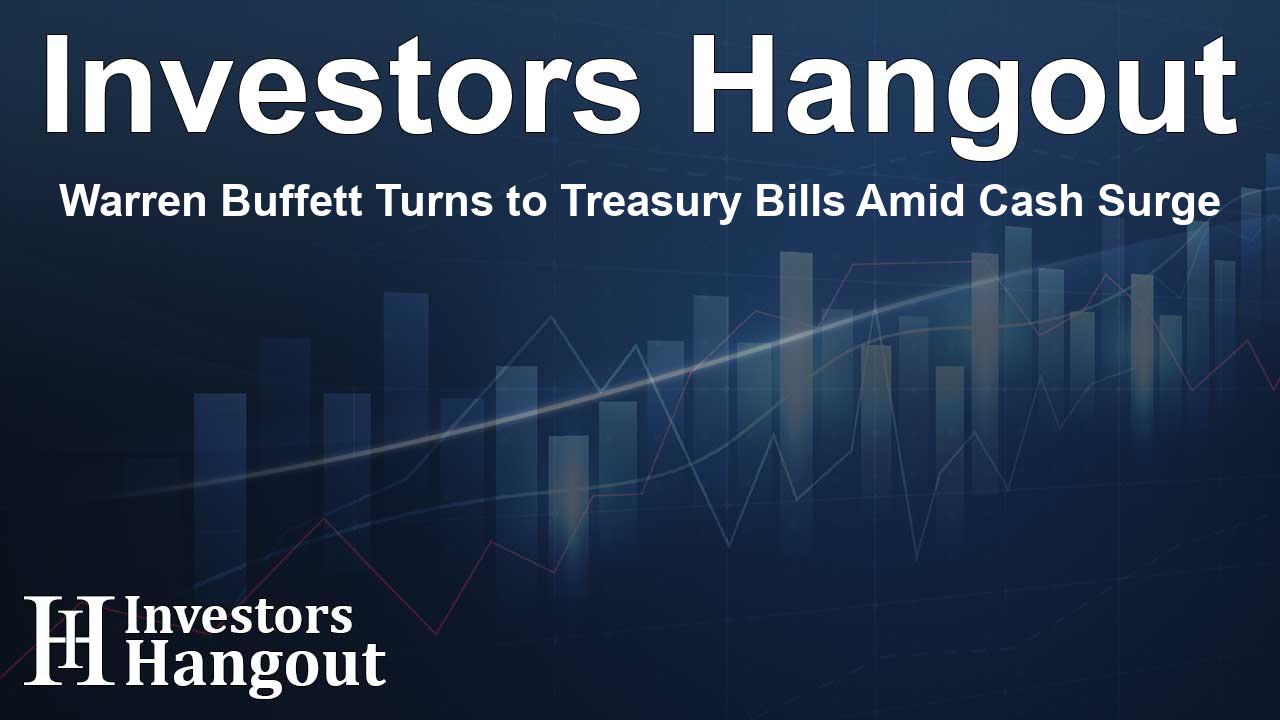Warren Buffett Turns to Treasury Bills Amid Cash Surge

Berkshire Hathaway's Shift in Investment Strategy
Berkshire Hathaway Inc.’s cash management strategy is evolving as a significant change is observed in the company’s share repurchase approach. Under the guidance of the esteemed Warren Buffett, the company seems to favor investing in Treasury bills offering a 5% return over repurchasing its own shares. This noteworthy preference indicates a strategic pivot that is attracting considerable attention in the financial world.
Decline in Share Repurchases
The amount spent on share buybacks by Berkshire Hathaway has seen a steep decline, dropping to $2.9 billion in recent evaluations. Comparatively, the figures stood at $9.2 billion in the previous year and $7.9 billion in the year before that. This trend, noted by Lawrence McDonald, founder of Bear Traps Report, reflects a significant reduction in repurchases even as the company’s cash reserves have soared remarkably.
Cash Reserves Surge
As of the latest reports, Berkshire's cash reserves have skyrocketed nearly 300% since 2022, culminating in an impressive $334 billion. This substantial increase has also spotlighted the contrast in Buffett’s traditional strategies, where owning thriving businesses has been the norm. With reserves inflating from $109 billion in 2022 to $277 billion in 2024, it's clear that Berkshire is navigating through a transformative phase.
Understanding the Rate of Change
Experts underline that it’s not just about the overall size of Berkshire’s cash reserves but the “rate of change” in these figures that is especially revealing. McDonald articulates that this rapid growth in cash reserves is pivotal, explaining that it signals a shift in strategy and market engagement.
The Implications of Treasury Investments
Buffett's preference for 5% Treasury bills comes amid rising fixed incomes in the current economic environment. The trend signifies a protective move against market unpredictability and offers a reliable yield as investing directly in shares presents its own set of risks. Buffett remains committed to maintaining a significant portion of investment in equities, especially within the American market.
Market Dynamics and Investor Sentiment
The decision to pivot towards Treasury investments is not solely about current returns; it also reflects the broader market dynamics. With stock valuations at an all-time high, Buffett encounters challenges in identifying and acquiring promising assets. This cautious yet strategic accumulation of cash alternatives is quite uncommon for the investment titan, who historically has preferred equity ownership.
Buffett's Ongoing Commitment to Shareholders
During his annual letter to shareholders, Buffett assured investors that, despite the burgeoning cash reserves, his intentions to deploy significant capital into equities remain unchanged. He emphasized that Berkshire will persistently direct a major portion of its funds back into business operations and high-quality investments, predominantly in the U.S.
A Future Focused on Stability
The significant maneuvering by Berkshire Hathaway not only illustrates Buffett's keenness for stability in uncertain times but also underscores his understanding of market trends. The strategic lean towards Treasury bills suggests a calculated approach, aiming to shelter wealth while simultaneously preparing for future investment opportunities as the market stabilizes.
What This Means for Investors
For investors observing Berkshire’s movements, these changes present a complex interplay of caution and opportunity. They might view this strategy as an evolving narrative on how one of the most iconic investors in history is adjusting to modern economic landscapes. Understanding these shifts will be crucial for stakeholders as they position themselves for future developments in Berkshire Hathaway’s investment journey.
Frequently Asked Questions
What recent changes have occurred in Berkshire Hathaway's buyback strategy?
Berkshire Hathaway’s buybacks have fallen significantly, from $9.2 billion in the previous year to just $2.9 billion recently, reflecting a shift in investment focus.
Why is Warren Buffett favoring Treasury bills over stock repurchases?
Buffett is prioritizing Treasury bills due to favorable rates and a cautious stance on stock valuations, as the current market conditions present challenges for acquiring attractive targets.
What insights did Lawrence McDonald provide regarding Berkshire's cash reserves?
Lawrence McDonald noted that the dramatic increase in Berkshire's cash reserves highlights a strategic change and underlines the importance of the 'rate of change' in these numbers.
How does Buffett plan to utilize Berkshire's cash in the future?
Buffett maintains that the majority of Berkshire's investments will continue to be in equities, especially in solid American companies, despite the increasing cash reserves.
What does Buffett's adjustment in strategy suggest about market conditions?
The adjustment illustrates Buffett’s awareness of the current market’s unpredictability and reflects a conservative approach to safeguard shareholder value while looking for future opportunities.
About The Author
Contact Ryan Hughes privately here. Or send an email with ATTN: Ryan Hughes as the subject to contact@investorshangout.com.
About Investors Hangout
Investors Hangout is a leading online stock forum for financial discussion and learning, offering a wide range of free tools and resources. It draws in traders of all levels, who exchange market knowledge, investigate trading tactics, and keep an eye on industry developments in real time. Featuring financial articles, stock message boards, quotes, charts, company profiles, and live news updates. Through cooperative learning and a wealth of informational resources, it helps users from novices creating their first portfolios to experts honing their techniques. Join Investors Hangout today: https://investorshangout.com/
The content of this article is based on factual, publicly available information and does not represent legal, financial, or investment advice. Investors Hangout does not offer financial advice, and the author is not a licensed financial advisor. Consult a qualified advisor before making any financial or investment decisions based on this article. This article should not be considered advice to purchase, sell, or hold any securities or other investments. If any of the material provided here is inaccurate, please contact us for corrections.
